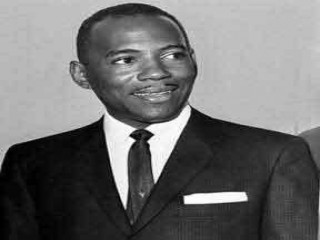
James H. Meredith biography
Date of birth : 1933-06-25
Date of death : -
Birthplace : Kosciusko, Mississippi, U.S.
Nationality : American
Category : Politics
Last modified : 2011-07-08
Credited as : Civil rights activist, lawyer,
As the first black to attend the University of Mississippi, James H. Meredith scored one of the earliest important victories against segregation in Mississippi.
Fiercely independent and keenly intelligent, James Meredith was the great iconoclast of the civil rights movement. As the first black to attend the University of Mississippi, Meredith scored one of the earliest important victories against segregation in Mississippi. At the same time, he remained largely aloof from the established civil rights organizations. Medgar Evers and the NAACP helped Meredith win his legal battle to integrate Ole Miss, but as Meredith proudly noted, "Nobody hand picked me. I made the decision myself. I paid my own tuition."
Born on a small farm near Kosciusko, Mississippi, on June 25, 1933, Meredith was the seventh of Cap Meredith's 13 children, and the first of seven by Cap's second wife, Roxie. Meredith, baptized simply as "J.H.," inherited his independent streak from his father. The family was poor and their home lacked running water, but they were self-sufficient. "I was taught," Meredith said later, "to believe the most dishonorable thing a Meredith could do was to work in a white woman's kitchen and take care of a white man's child." Seeking a better education than he could attain in Mississippi, Meredith moved to St. Petersburg, Florida, where he lived with an aunt, and graduated from high school in 1951. Lacking money for college, he joined the U.S. Air Force, under the name "James Howard Meredith." To the young Mississippian, attacking Jim Crow meant self-improvement, and that required money and education. In the service, Meredith saved much of his modest pay and routinely took classes at nearby schools, including the University of Kansas, Washburn University in Topeka, New Mexico Western College, and even the University of Maryland's Japan campus. After a nine-year hitch in the Air Force, Meredith returned to Mississippi and entered the all-black Jackson State University. His decision to seek admission at the all-white University of Mississippi reflected his strategy to attack a system of segregation that limited the economic opportunities open to blacks. "Before I could engage in business at the level I desired," he believed, "the system would have to be broken." Convinced that the new president, John F. Kennedy, would support his efforts, Meredith, on January 21, 1961, the day after Kennedy's inauguration, wrote Ole Miss for an application form.
Meredith's letter touched off an 18-month legal battle. Mississippi's white authorities had already demonstrated that they would try virtually anything to avoid integrating the state's colleges and universities. A black teacher, Clennon King had been committed to a mental institution in 1958 for attempting to attend summer school at Oxford. Another black man, Clyde Kennon, was sent to prison on trumped-up charges after attempting to enroll at the University of Southern Mississippi. In Meredith's case, state officials resorted to a variety of legal ploys, but in June 1962, the U.S. Court of Appeals for the Fifth Circuit ordered Meredith admitted to the university. Nevertheless, Mississippi's racist governor, Ross Barnett, personally intervened to bar Meredith physically from entering Ole Miss. In a televised address, Barnett incited white resistance and warned: "There is no case in history where the Caucasian race has survived social integration." Finally, late in September, Kennedy ordered federal troops and Justice Department officials to enforce the court order admitting Meredith to school. On Sunday afternoon, September 30, 1962, Meredith arrived on campus accompanied by a federal entourage that included over 120 U.S. marshals and Deputy Attorney General Nicholas Katzenbach. The result was a night-long riot that resulted in two deaths, 175 injuries, and 212 arrests. Despite one of the most violent challenges to federal authority since the Civil War, Meredith was quietly registered the next day. Enduring taunts and abuse from many of his fellow students, in August 1963 Meredith became the first black graduate of the University of Mississippi.
In 1964-65, Meredith studied economics at the University of Ibadan in Nigeria. The following year, he proposed to walk from Memphis, Tennessee, to Jackson, Mississippi, to encourage blacks to register to vote. The walk attracted widespread attention after a white supremacist wounded Meredith with a shotgun blast, and black leaders, including Martin Luther King, Jr., and Stokely Carmichael, flocked to Mississippi to help him complete his trek. Meredith later moved to New York City where he bought an apartment house and experienced a variety of financial and legal problems, among them a conviction for harassing his tenants. Meredith briefly considered running for Congress against Harlem's incumbent Adam Clayton Powell. In 1968, Meredith received a law degree from Columbia University, but by the early 1970s, he had returned to Mississippi, where he continued to pursue a variety of business, political, and community activities. In 1972, Meredith ran unsuccessfully as a Republican against Mississippi Senator James O. Eastland. He served as a visiting professor at the University of Cincinnati in 1984-85, and was defeated in 1986 in a race for a position on the Cincinnati school board. In recent years, Meredith has been associated with conservative causes and candidates, but his historical significance derives from his integration of Ole Miss, which heralded the changes that would eventually come to the most racially divided state in the nation.
















